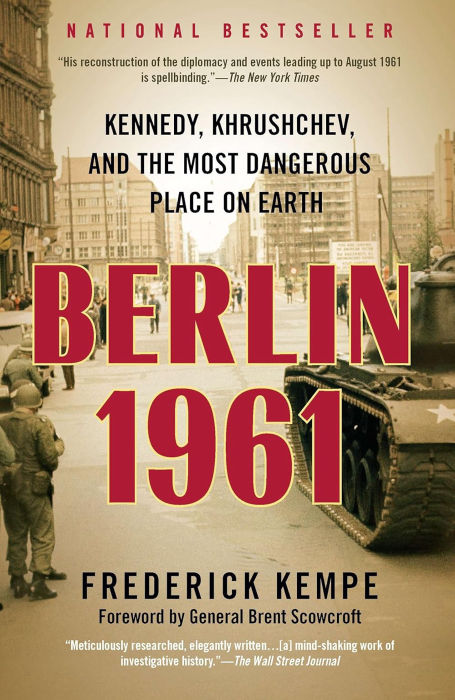Books
Frederick Kempe
Berlin 1961
Kennedy, Khrushchev, and the Most Dangerous Place on Earth
How did a divided city become the epicenter of Cold War brinkmanship, bringing the world to the edge of nuclear conflict? Berlin 1961 tells the gripping story of President John F. Kennedy and Soviet Premier Nikita Khrushchev as they faced off over the fate of Berlin—culminating in the construction of the Berlin Wall and a tense standoff that defined a generation.
This book provides a detailed narrative of the Berlin Crisis of 1961, when the unresolved status of Berlin became the focal point of superpower rivalry. Drawing on newly available sources and personal accounts, Fred Kempe reconstructs the dramatic events from the Vienna Summit in June 1961—where Khrushchev issued fresh threats and found Kennedy unsettled—to the sudden sealing of the Berlin border and the rapid construction of the Berlin Wall on August 13, 1961. Kempe reveals how Kennedy’s cautious approach and signals of limited U.S. commitment to East Berlin effectively gave Khrushchev the green light to act, as long as Western access to West Berlin was preserved.
The book details the tense tank standoff at Checkpoint Charlie, the internal deliberations of both U.S. and Soviet leadership, and the broader implications for Cold War strategy. Kempe also explores the personal dynamics between Kennedy and Khrushchev, showing how their miscalculations and mutual perceptions shaped the crisis. The narrative captures the anxiety and uncertainty faced by Berliners and the world as the two superpowers came perilously close to direct military confrontation.
Kempe’s analysis extends to the aftermath, arguing that Kennedy’s handling of the crisis, while avoiding war, emboldened Khrushchev to take further risks—setting the stage for the Cuban Missile Crisis the following year. The book situates Berlin 1961 as a pivotal moment in the Cold War, with lasting consequences for U.S.-Soviet relations and the shape of divided Europe.
Berlin 1961: Kennedy, Khrushchev, and the Most Dangerous Place on Earth stands out for its vivid storytelling and incisive analysis of one of the Cold War’s most dangerous confrontations. Fred Kempe’s account illuminates how leadership decisions, diplomatic signals, and the fate of a single city shaped the global order—making this book essential reading for anyone interested in the history of the Cold War, crisis diplomacy, and the enduring legacy of the Berlin Wall.

